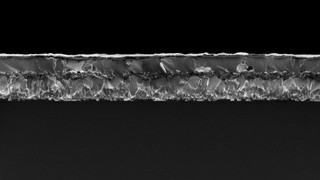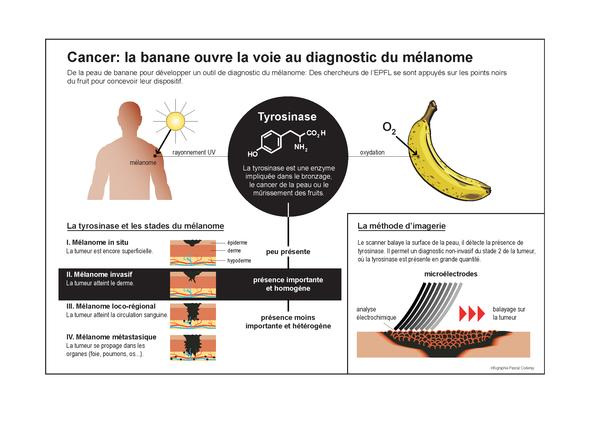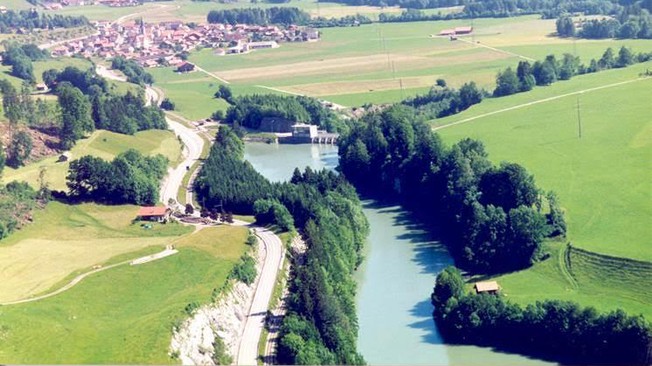Looking back at 2016 (1/2)

© iStock
Health, energy, maths and chocolate: no field of research has been neglected last year by EPFL's scientists.
Cheaper solar cells with 20.2% efficiency
 18.01.16 – Some of the most promising solar cells today use light-harvesting films made from perovskites. However, perovskite-based solar cells use expensive “hole-transporting” materials, whose function is to move the positive charges that are generated when light hits the perovskite film. EPFL researchers have now engineered a considerably cheaper hole-transporting material that still delivers a solar-cell efficiency of 20.2%. Later on, they even achieved a 21.6% efficiency by adding rubidium.
18.01.16 – Some of the most promising solar cells today use light-harvesting films made from perovskites. However, perovskite-based solar cells use expensive “hole-transporting” materials, whose function is to move the positive charges that are generated when light hits the perovskite film. EPFL researchers have now engineered a considerably cheaper hole-transporting material that still delivers a solar-cell efficiency of 20.2%. Later on, they even achieved a 21.6% efficiency by adding rubidium.
Cancer: banana peels can help identify the stages of melanoma
 08.02.16 – Human skin and banana peels have something in common: they produce the same enzyme when attacked. When bananas age, they become covered in black spots caused by the enzyme tyrosinase. This is a natural browning process common among certain organisms. This same enzyme also plays a role in the type of skin cancer known as melanoma. By studying fruit, researchers have come up with an accurate method for diagnosing the stages of this form of skin cancer.
08.02.16 – Human skin and banana peels have something in common: they produce the same enzyme when attacked. When bananas age, they become covered in black spots caused by the enzyme tyrosinase. This is a natural browning process common among certain organisms. This same enzyme also plays a role in the type of skin cancer known as melanoma. By studying fruit, researchers have come up with an accurate method for diagnosing the stages of this form of skin cancer.
Math reveals unseen worlds of Star Wars
 10.02.16 – EPFL researchers have revealed some interesting statistics on the famous Star Wars saga. Drawing on the principles of graph theory, which harnesses computing power and mathematical calculations, they analyzed hundreds of web pages devoted to the legendary film series created in the 1970s by director George Lucas. They showed that the Star Wars universe is huge, with no less than 20,000 characters in 640 communities spanning 36,000 years.
10.02.16 – EPFL researchers have revealed some interesting statistics on the famous Star Wars saga. Drawing on the principles of graph theory, which harnesses computing power and mathematical calculations, they analyzed hundreds of web pages devoted to the legendary film series created in the 1970s by director George Lucas. They showed that the Star Wars universe is huge, with no less than 20,000 characters in 640 communities spanning 36,000 years.
Amputee feels texture with a bionic fingertip
 08.03.16 – An amputee was able to feel smoothness and roughness in real-time with an artificial fingertip that was surgically connected to nerves in his upper arm. This advancement will accelerate the development of touch-enabled prosthetics and provide new avenues for developing bionic prostheses.
08.03.16 – An amputee was able to feel smoothness and roughness in real-time with an artificial fingertip that was surgically connected to nerves in his upper arm. This advancement will accelerate the development of touch-enabled prosthetics and provide new avenues for developing bionic prostheses.
An implant to prevent Alzheimer’s
 17.03.16 – One of the hypothesized causes of Alzheimer’s is the over-accumulation of the protein amyloid beta (Abeta) in different areas of the brain. One of the most promising ways to fight the plaques is to “tag” the Abeta proteins with antibodies that signal the patient’s own immune system to attack and clear them. But that requires repeated vaccine injections, which can cause side effects. EPFL scientists have developed an implant that can deliver a steady and safe flow of antibodies to a patient’s brain.
17.03.16 – One of the hypothesized causes of Alzheimer’s is the over-accumulation of the protein amyloid beta (Abeta) in different areas of the brain. One of the most promising ways to fight the plaques is to “tag” the Abeta proteins with antibodies that signal the patient’s own immune system to attack and clear them. But that requires repeated vaccine injections, which can cause side effects. EPFL scientists have developed an implant that can deliver a steady and safe flow of antibodies to a patient’s brain.
Using turbulence to keep dams clean
 20.04.16 – Sediment builds up in reservoir water and can prevent dams from operating properly. But a team from EPFL has developed a clever way to address this problem: submerged water jets that create turbulence and keep tiny sediment particles in suspension so they can be carried away through the dam’s water turbines. This process, which is designed to prevent some sediment from settling to the bottom and may even stir up silt already on the bottom, is set to prolong reservoirs’ useful lives.
20.04.16 – Sediment builds up in reservoir water and can prevent dams from operating properly. But a team from EPFL has developed a clever way to address this problem: submerged water jets that create turbulence and keep tiny sediment particles in suspension so they can be carried away through the dam’s water turbines. This process, which is designed to prevent some sediment from settling to the bottom and may even stir up silt already on the bottom, is set to prolong reservoirs’ useful lives.
Switzerland sends chocolate into space
 26.04.16 – The Swiss Space Center prepared a box of chocolates for each astronaut on the International Space Station (ISS). Each box contained six little bars of milk chocolate. But this mission was no cakewalk. It took six months for the chocolates to finally get off the ground: the chocolates had to undergo a full gamut of checks and tests, and the launch was delayed several times.
26.04.16 – The Swiss Space Center prepared a box of chocolates for each astronaut on the International Space Station (ISS). Each box contained six little bars of milk chocolate. But this mission was no cakewalk. It took six months for the chocolates to finally get off the ground: the chocolates had to undergo a full gamut of checks and tests, and the launch was delayed several times.
A vitamin that stops the aging process of organs
 28.04.16 – Nicotinamide riboside (NR) is pretty amazing. It has already been shown in several studies to be effective in boosting metabolism. And now a team of researchers at EPFL’s Laboratory of Integrated Systems Physiology (LISP) has unveiled even more of its secrets. By administering nicotinamide riboside to elderly mice, the scientists were able to restore the ability of the mice’s organs to regenerate and prolonged their lives.
28.04.16 – Nicotinamide riboside (NR) is pretty amazing. It has already been shown in several studies to be effective in boosting metabolism. And now a team of researchers at EPFL’s Laboratory of Integrated Systems Physiology (LISP) has unveiled even more of its secrets. By administering nicotinamide riboside to elderly mice, the scientists were able to restore the ability of the mice’s organs to regenerate and prolonged their lives.
Producing electrical power with cardboard, tape and a pencil
 25.01.16 – All you need to generate electricity is cardboard, Teflon tape and a pencil. A team from EPFL, working with researchers from the University of Tokyo, used these materials to make an 8 cm2 device that can generate a considerable current. This is a simple, eco-friendly and inexpensive system that can operate microsensors, for example. The system was presented at a global conference on micro- and nano- systems in Shanghai.
25.01.16 – All you need to generate electricity is cardboard, Teflon tape and a pencil. A team from EPFL, working with researchers from the University of Tokyo, used these materials to make an 8 cm2 device that can generate a considerable current. This is a simple, eco-friendly and inexpensive system that can operate microsensors, for example. The system was presented at a global conference on micro- and nano- systems in Shanghai.
Augmented reality for firefighters
 25.05.16 – All firefighters – volunteers and professionals alike – have to cope with flames. But fire is not the only risk they face. Toxic, impenetrable smoke and darkness add to the dangers and slow the firefighters’ progress. An EPFL team has developed a smart visor that, combined with a thermal imaging camera, can help firefighters see what’s around them in real time, even at night and in smoke.
25.05.16 – All firefighters – volunteers and professionals alike – have to cope with flames. But fire is not the only risk they face. Toxic, impenetrable smoke and darkness add to the dangers and slow the firefighters’ progress. An EPFL team has developed a smart visor that, combined with a thermal imaging camera, can help firefighters see what’s around them in real time, even at night and in smoke.
Nano-watermark sorts fakes from genuines
 27.06.16 – Nanoga, an EPFL-based startup, has developed a new way of combatting counterfeits by making each product unique without changing its appearance. Their process involves creating an image that is invisible to the naked eye and can be seen only under ultraviolet light. It was initially developed for high-end sapphire crystal watches, but Nanoga has just patented a system of photonic watermarks for glass, ceramic and metal as well.
27.06.16 – Nanoga, an EPFL-based startup, has developed a new way of combatting counterfeits by making each product unique without changing its appearance. Their process involves creating an image that is invisible to the naked eye and can be seen only under ultraviolet light. It was initially developed for high-end sapphire crystal watches, but Nanoga has just patented a system of photonic watermarks for glass, ceramic and metal as well.